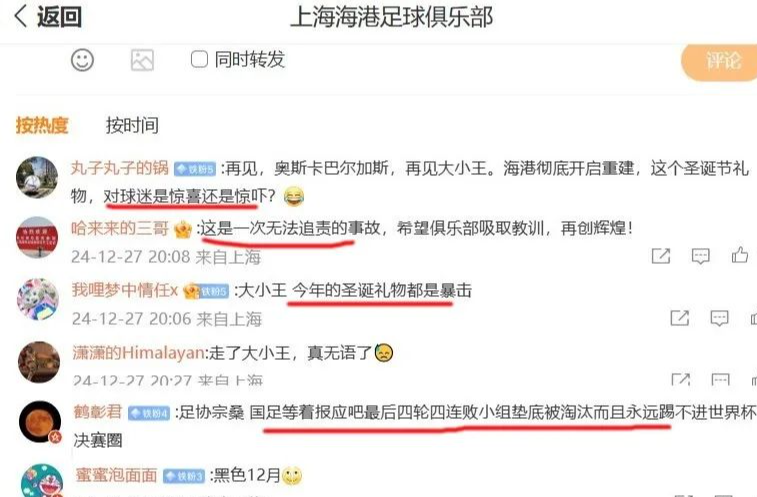In the midst of Shanghai Port's celebration of their "double championship," the team experienced an unexpected turn of events. During the Christmas period, the club announced the departure of two key foreign players, dealing a significant blow to fans who were still reveling in the joy of victory.

Firstly, Brazilian player Oscar, who had served the team for eight years, announced his departure. As the captain and core player of the team, Oscar made significant contributions during his time with Shanghai Port. He not only demonstrated exceptional skills and leadership on the field but also expressed deep affection for the city of Shanghai on multiple occasions. However, when Brazilian club Sao Paulo FC extended an invitation, the Brazilian star chose to return to his homeland. Although this decision was seen as expected by many, it still came as a shock and with reluctance to the fans when it happened.

Following Oscar's announcement, the team also declared the departure of another important foreign player, Bargas. Unlike Oscar's situation, Bargas' future destination remains uncertain, but the team's decision to release the departure notice early added to the fans' concerns. The consecutive departures of these "big and small kings" dealt a severe blow to the team's strength within a short week.

The core reason behind these changes is the salary cap policy implemented by the Chinese Football Association. The new policy stipulates that the annual salary of foreign players cannot exceed 3 million euros, and the total annual salary of foreign players per team must not exceed 10 million euros. This policy directly affects the ability of clubs like Shanghai Port to retain high-paid foreign players. For foreign players accustomed to high salaries, the significant pay gap is naturally difficult to accept, making departure seem like an inevitable choice.

Even more worrying is the revelation from reliable sources that Brazilian player Chitadini may be the next to leave the team. If this rumor proves true, Shanghai Port will lose three key foreign players in a short period. However, fortunately, the team originally had six foreign players, and even if they lose three, they still maintain a certain foreign player framework. At the same time, the departure of high-paid foreign players has freed up new salary space, creating possibilities for the introduction of new foreign players.
From a broader perspective, Shanghai Port's current situation is relatively better compared to other Chinese Super League teams. In the current transition period of Chinese football, many clubs face more severe challenges, with some even struggling to pay wages on time and unable to gather the basic five foreign players. In contrast, Shanghai Port still maintains a relatively stable financial status and competitiveness.
These changes also reflect the transformation pains that Chinese football is undergoing. The past model of relying on high salaries to attract foreign players is no longer sustainable, and all clubs need to adapt to the new policy environment and establish healthier development models. For Shanghai Port, although the departure of core foreign players will affect the team's strength in the short term, this could also be an opportunity for readjustment and transformation.
Looking to the future, Shanghai Port needs to use existing resources more reasonably under the new policy framework, maintain its competitiveness in the Chinese Super League through scientific management and training systems, and focus more on youth training to cultivate local talent, moving towards a more sustainable development path. Although the adjustment period may bring pain, in the long run, this transformation is necessary for the healthy development of Chinese football.